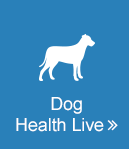Motion Sickness in Dogs
Motion sickness is pretty easy to spot in dogs. Most pet parents can see the signs of nausea in their pups: hanging their head, drooling, yawning and of course, vomiting. This affliction is quite common in puppies and young dogs, but the good news is that most dogs tend to grow out of it the way people do. Young animals do not have fully developed inner ears so the motion throws off their balance. Adult dogs that are not used to riding in the car may also experience the same discomfort, but most animals eventually will get used to it.
If your dog tends to get sick riding in the car, it is best to avoid feeding them (even a treat) for about an hour before the car ride so there is nothing in their stomach to vomit. Crates are always a safe option for travelling with dogs, plus if the dog does get sick it will be contained. Make sure there is good air flow in the car from air conditioning or an open window because that can help ease the dog’s stomach. Calming supplements or ginger supplements can help sooth your dog’s nervous stomach. Talk to your vet about anti-nausea medications for serious cases or dogs that do not grow out of the condition.
Studies
Control of car sickness in a dog by V-12.
Motion sickness potentiates core cooling during immersion in humans.
Motion sickness: more than nausea and vomiting.


